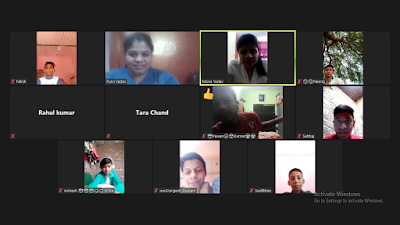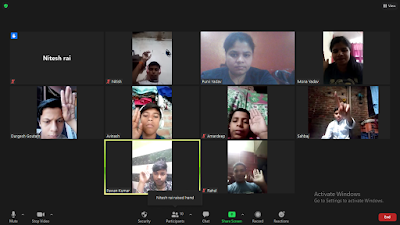“There is always a protection veil over girls, a control, and a sort of management over them. When they are child, they are under their father’s shade, when they grow up and get married they come under the territory of husband and when they grow old, their son manages and takes decision for them”
In the wake of gruesome
Hathras gang rape, safety of women and the rising number of incidences
of cruelty against women has captured once again the attention of vast number
of Indians who otherwise prefer bystander attitude. Along with this, the state
machinery of Uttar Pradesh, the role of Police and the caste discrimination
that seemed long buried in wake of modern India has come under scrutiny. There
were so many red flags in the case that shows that despite howling of
progressive India for ages, we are so behind addressing violence against women.
It is sad, that we talk about violence against women only when a rape case is
highlighted by Media one in blue moon. None of this is product of one moment of
rage or expression of power, this is deep ingrained belief system which is deep
rooted in patriarchy which is extremely visible and invisible at the same time
in almost all spheres of our lives.
Interestingly our workshop
coincides with Dusshera, and when the zoom meeting started – it was worth
mentioning that all the police personnel were located in different settings
bubbling with excitement – some of them in park duty, few of them on bus stand
duty, some of them were in police station and none of them were sitting all by
themselves. Moments like these make us realize the importance of our work and when
collaborated with government machinery – the impact it can create in bringing
out the social change that is much needed in today’s narrative.
The workshop on gender
sensitization and role of police in dealing with gender based violence free
from biases began with the introduction on the need and importance of why the
conversation on gender, discrimination and violence are must backed with the
data from NCRB and Thomas Reuters foundation report 2018.
Following the screening
of video on gender equality, we invited them to share the gender difference
they see in different spaces – home, education, workplace – police in this
case, public spaces, religion and media.
‘I think men and women
in the police station have almost same duty, they get same attention however
when they reach home everything is different; it is the men who is the decision
maker in the house and women who does household chores’
‘There are lot of
difference as to how men and women function in police duty. Men are fearless
and full of authority in their police duty, while women are scared even in
their uniform because the outside people see them as women, who are not as
strong as they are. Also when it comes to day and night duty – it is mostly the
men who are assigned night patrol because it’s not safe for women even though
they might be police in night’
‘All the news related
to women are treated with insensitivity, they are shown with shame and disgust.
There is so much anger in people that they make hue and cry of minute things,
which blow out of proportion followed by mudslinging on social media resulting
on lot of fake reports. It’s painful and exhausting.’
‘There is meagre
contribution of women in terms of religion and its practice. The priests are
male, the havans and other practices are carried by men, we hardly see
women anywhere near religious gatherings as well.’
‘The difference between
girls and boys in education is evidently clear. Girls are provided education in
a very cautious way, they are constantly reminded that they need to be careful
and wary of people around them. The teachers teaches them differently – girls are
always taught in restricted environment that lacks the freedom while boys are
free of any restraints and enjoys as if they own the world. The teaching
mindset and style is based on gender bias. ’
‘Talking about public
spaces, for example bus stand – you can see boys standing with zero ounce of
care in the world, they are loud, throwing comments here and there, making
themselves very visible while girls stand in corner, almost closing themselves
to be invisible scared and almost ready to flee’
Taking cues from these
responses, we engaged on what is gender, how these gender difference impact
different aspects of our day to day lives, why these bias exists and how this
discrimination lead to violence!
‘I think all this
gender difference begins at home where the mother teaches their daughter to behave
in certain way, tells her to do household chores but gives free reign to boys’
‘While I agree that gender
bias begins at home, it is also the responsibility of teachers and elders
around to make girls understand that they need to be very careful, and not engage
with strangers because people can’t be trusted’
These statements are
like sharp edged swords because they reflect ignorance and deep rooted
patriarchal mindset which places the burden of violence on women indicating
that it is women who starts the cycle of violence because she is the one who is
responsible for children and their upbringing; secondly the responsibility to
protect herself from violence is also thrown very casually on her shoulder
while giving a free pass to men. What a wonderful way to wipe the hands
altogether for the violence caused by men!
We took a quick poll on
few statements asking them whether they think that it reflects violence or not!
To our surprise most of them agreed that all the statements comes under
violence.
Taking examples from
their previous answers and poll statements – we talked in detail about what is
gender based violence, different types with real life examples, the impact of
GBV on women and on country at large followed by some very threatening data
points reflecting the severity of the current situation of violence in India.
To further establish
the understanding on gender and gender based violence; we gave them different situations
enquiring their course of action!
‘Before taking any
procedural action required in the rape case, I would make sure that she is
doing okay, and get her medical assistance. I would treat her like my daughter
and provide as much as comfort and support as I can’
‘This is the case of
child sexual abuse, I would instruct personnel dressed in casual clothing to go
along with the boy for medical, provide comfort to the parents and direct the
concerned official to take appropriate action’
‘When the women police
officer reports a sexual harassment complaint against the senior, I would report
it to senior women official, take all the details and file the case as soon as
possible’
‘In this case, we would
ask both the parties that is girl’s parents and her would be in laws to come to
police station where we would make them understand that dowry must not be
taken, we would tell them about legal action that could be taken against them
and if they still go ahead and ask for dowry, we would file FIR and take appropriate
action.’
‘We need to change the
mindset, the way we see women, the way we differentiate and how we tackle the
cases involving women. I will try and use this information in the cases!’
These responses gave us
hope!
‘I loved the workshop.
It was so informative and such discourse must continue, it gives us an
opportunity to learn, rethink and increases our confidence. There are people
who grasp the information immediately, answer the questions and take action on
the spot while others take time to understand the information, once that sinks
in they inculcate this in their course of action. It is very important that
these conversations continue to take place because it spreads awareness around
crucial issues. Crimes are increasing with each day, we not only have to curb
them but build a system that employs reformative approach’




























